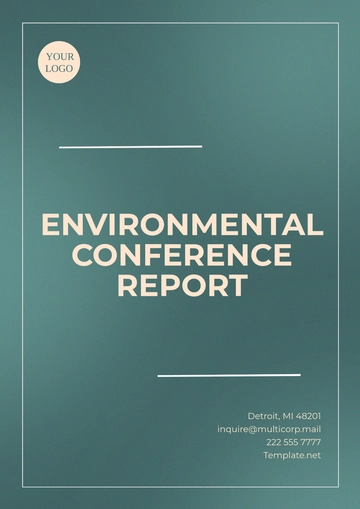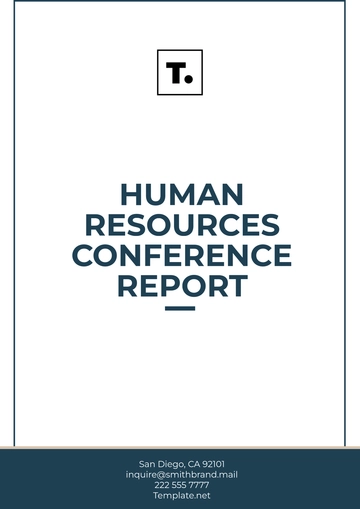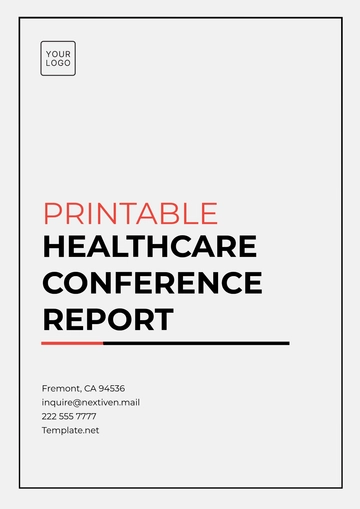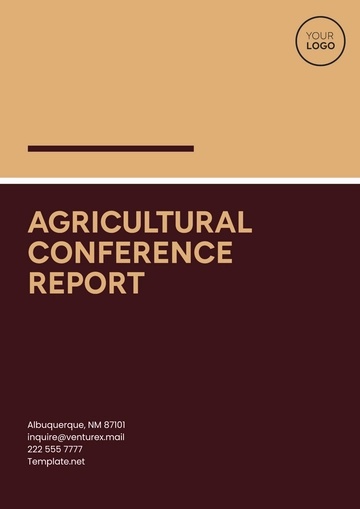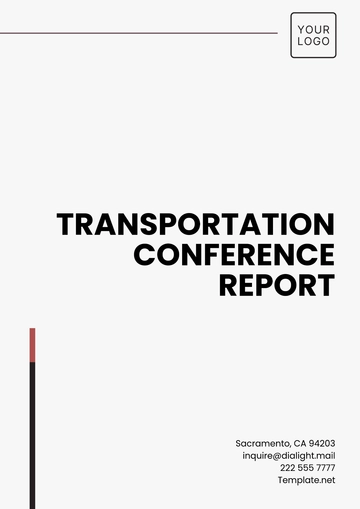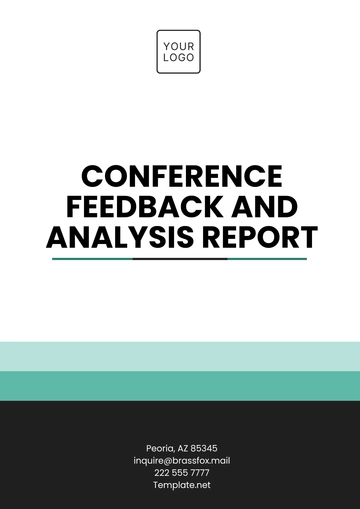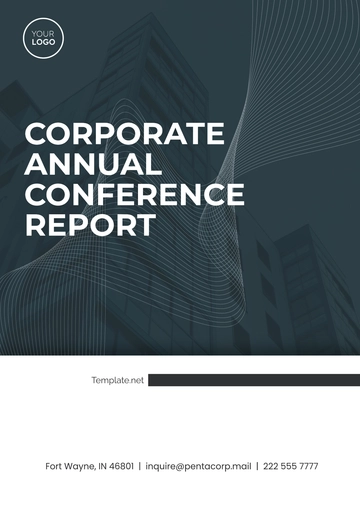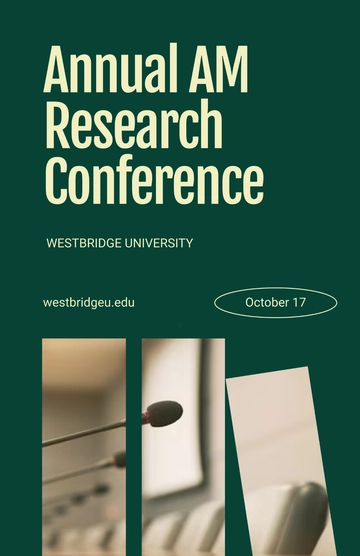Free Agricultural Conference Report
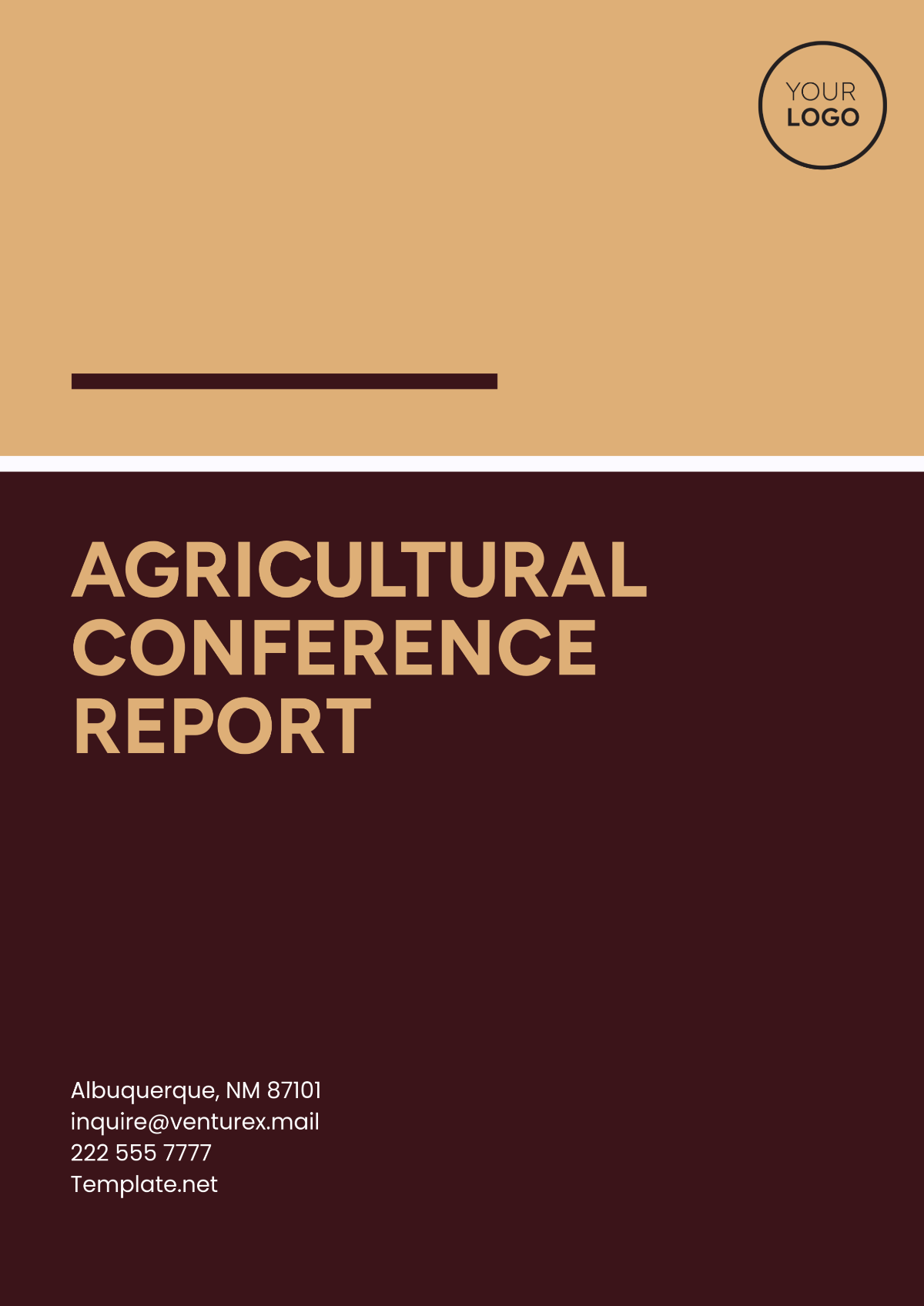
Prepared by:
[YOUR NAME]
[Your Company Name]
Date: November 28, 2050
Introduction
This report summarizes the Agricultural Conference held at the Global Convention Center in Greenfield City on November 25, 2050. The conference brought together experts, policymakers, farmers, and industry stakeholders to discuss emerging trends and strategies in global agriculture. Focus areas included climate change adaptation, technological innovations, sustainable farming practices, and solutions for ensuring food security. The event provided a platform for collaboration and knowledge-sharing across the agriculture sector, highlighting both challenges and opportunities for the future of farming.
Conference Objectives
The main objectives of the 2050 Agricultural Conference were:
To explore and present the latest innovations in sustainable agricultural technologies.
To address the challenges posed by climate change and its impact on global food systems.
To foster collaboration between governments, the private sector, and farmers to promote agricultural resilience.
To provide practical recommendations for improving global food security.
Keynote Sessions
1. Sustainable Agricultural Practices: Pathways to Resilience
Dr. Sarah Thompson, a leading expert in sustainable agriculture, opened the conference with an insightful keynote on sustainable farming practices. She emphasized the importance of integrating regenerative techniques like agroforestry, crop rotation, and soil conservation into mainstream farming. Dr. Thompson argued that these methods not only improve soil health but also help farmers build resilience against climate disruptions.
2. Climate Change and Agricultural Adaptation
Dr. James Foster, a renowned climate scientist, presented a detailed analysis of the increasing risks posed by climate change to agriculture. He outlined how rising global temperatures, shifting rainfall patterns, and extreme weather events, such as floods and droughts, were directly impacting crop yields. Dr. Foster stressed the urgent need for the agricultural sector to adapt through the development of drought-resistant crops, improved irrigation technologies, and enhanced disaster preparedness strategies.
3. Agri-Tech Innovations: Driving the Future of Farming
A panel of experts from top agri-tech firms showcased the latest advancements in agricultural technologies, from AI-powered farm management systems to autonomous tractors. These innovations aim to optimize resource use, reduce waste, and increase productivity. A particularly noteworthy technology discussed was the use of drones for precision agriculture, which allows farmers to monitor crops in real time, apply fertilizers more efficiently, and detect early signs of disease.
Workshops and Breakout Sessions
1. Regenerative Agriculture: Restoring Soil Health
In this workshop, participants were introduced to regenerative farming practices designed to restore soil health and promote biodiversity. Key techniques such as no-till farming, cover cropping, and holistic livestock management were discussed. The session highlighted how these methods contribute to carbon sequestration, better water retention, and improved farm productivity over time.
2. Smallholder Farmers and Agroecology
This breakout session explored the role of smallholder farmers in achieving sustainable agricultural systems. Dr. Maria Gonzalez, a leading agroecologist, discussed how small-scale, local farming operations could use agroecology to increase productivity while conserving the environment. Participants learned about practical strategies for incorporating ecological principles, such as integrating trees into farming systems, and the importance of preserving biodiversity.
3. Food Security Policies: A Global Perspective
A session on global food security highlighted the role of policy in ensuring equitable access to food. Experts discussed how governments can implement policies that support smallholder farmers, reduce food waste, and improve food distribution networks. Strategies such as increasing investment in agricultural infrastructure and strengthening food supply chains were outlined as essential for building a more resilient food system.
Key Findings
1. Technological Advancements Boosting Agricultural Efficiency
Technological innovations are transforming agriculture, making it more efficient and environmentally friendly. Precision farming technologies, such as GPS-guided tractors, automated irrigation systems, and AI-based crop monitoring, allow farmers to optimize input use and increase yields. These technologies are especially beneficial for reducing the environmental footprint of farming.
2. Urgency of Climate Adaptation Measures
The conference underscored the need for immediate action to help farmers adapt to the impacts of climate change. This includes developing more resilient crop varieties, improving irrigation systems, and adopting climate-smart farming practices. Governments, the private sector, and research institutions must collaborate to support farmers in transitioning to climate-resilient farming systems.
3. Collaboration Across Sectors is Critical
Successful agricultural development requires cooperation among various stakeholders, including farmers, policymakers, researchers, and technology providers. Public-private partnerships are essential for fostering innovation and supporting the adoption of sustainable practices. Effective collaboration can help ensure that solutions are accessible and scalable, particularly in developing regions.
Recommendations
Based on the discussions at the 2050 Agricultural Conference, the following recommendations were made:
Invest in Climate-Resilient Agricultural Technologies Governments and private enterprises should prioritize funding for research into climate-resilient crops, sustainable farming technologies, and innovative water management solutions. These investments will help farmers adapt to changing climate conditions and secure food production in the face of future uncertainties.
Encourage Widespread Adoption of Regenerative Agriculture Farmers should be encouraged to adopt regenerative farming techniques that improve soil health, sequester carbon, and enhance biodiversity. Financial incentives, such as subsidies for adopting sustainable practices, can help accelerate this transition.
Strengthen Global Food Security Policies Countries should develop and implement comprehensive policies that promote food security, including reducing food loss and waste, supporting local food systems, and improving access to markets for smallholder farmers. Governments must also invest in the agricultural sector's infrastructure to enhance resilience and distribution networks.
Promote Agricultural Education and Extension Services Farmers need access to training on sustainable farming practices, new technologies, and climate change adaptation strategies. Agricultural education and extension services should be expanded to ensure farmers are equipped with the knowledge and skills needed to thrive in a rapidly changing agricultural landscape.
Conclusion
The 2050 Agricultural Conference provided invaluable insights into the future of agriculture. Climate change, technological innovation, and sustainable farming practices are at the forefront of the sector’s evolution. To meet global food demands and build resilient agricultural systems, the recommendations outlined in this report must be implemented. By fostering collaboration, investing in research and development, and supporting sustainable practices, we can ensure a thriving agricultural sector capable of feeding the world for generations to come.
- 100% Customizable, free editor
- Access 1 Million+ Templates, photo’s & graphics
- Download or share as a template
- Click and replace photos, graphics, text, backgrounds
- Resize, crop, AI write & more
- Access advanced editor
The Agricultural Conference Report Template from Template.net is fully editable and customizable to suit your needs. Easily adjust content, design, and layout using our AI Editor Tool to create a professional, tailored report. Perfect for documenting agricultural events, this template ensures clarity, accuracy, and a polished presentation of key discussions and insights.
You may also like
- Sales Report
- Daily Report
- Project Report
- Business Report
- Weekly Report
- Incident Report
- Annual Report
- Report Layout
- Report Design
- Progress Report
- Marketing Report
- Company Report
- Monthly Report
- Audit Report
- Status Report
- School Report
- Reports Hr
- Management Report
- Project Status Report
- Handover Report
- Health And Safety Report
- Restaurant Report
- Construction Report
- Research Report
- Evaluation Report
- Investigation Report
- Employee Report
- Advertising Report
- Weekly Status Report
- Project Management Report
- Finance Report
- Service Report
- Technical Report
- Meeting Report
- Quarterly Report
- Inspection Report
- Medical Report
- Test Report
- Summary Report
- Inventory Report
- Valuation Report
- Operations Report
- Payroll Report
- Training Report
- Job Report
- Case Report
- Performance Report
- Board Report
- Internal Audit Report
- Student Report
- Monthly Management Report
- Small Business Report
- Accident Report
- Call Center Report
- Activity Report
- IT and Software Report
- Internship Report
- Visit Report
- Product Report
- Book Report
- Property Report
- Recruitment Report
- University Report
- Event Report
- SEO Report
- Conference Report
- Narrative Report
- Nursing Home Report
- Preschool Report
- Call Report
- Customer Report
- Employee Incident Report
- Accomplishment Report
- Social Media Report
- Work From Home Report
- Security Report
- Damage Report
- Quality Report
- Internal Report
- Nurse Report
- Real Estate Report
- Hotel Report
- Equipment Report
- Credit Report
- Field Report
- Non Profit Report
- Maintenance Report
- News Report
- Survey Report
- Executive Report
- Law Firm Report
- Advertising Agency Report
- Interior Design Report
- Travel Agency Report
- Stock Report
- Salon Report
- Bug Report
- Workplace Report
- Action Report
- Investor Report
- Cleaning Services Report
- Consulting Report
- Freelancer Report
- Site Visit Report
- Trip Report
- Classroom Observation Report
- Vehicle Report
- Final Report
- Software Report




